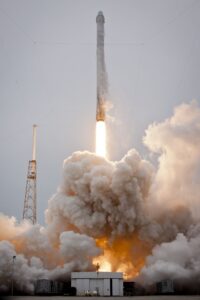by Malak Trabelsi Loeb
Setting The Scene

The space industry has been undergoing a metamorphosis propelled by an unprecedented paradigm shift induced by innovative technologies, new investment philosophy, and competitive politico-economic trends. The progressive space sector’s internationalization, civilianization, and commoditization induced the emergence of New Space, which may be defined as “the emergence of a different ethos for space where the established aerospace methods and business have been challenged by the more entrepreneurial private sector, adopting more agile approaches and exploiting the latest commercial “off-the-shelf technologies.” The space sector’s transformation has positively impacted the space economy. The global space revenue increased from 216.6 billion U.S. dollars to 423.8 billion U.S. dollars in 2019[1].
Nonetheless, different data sources show various discrepancies, while comparative analyses demonstrate the lack of accuracy in the different valuations. Taking the same year as a reference, the space economy was valued at 423.8 billion U.S. dollars by Space Foundation[2], in contrast to Bryce Space and Technology’s estimates valued at 366 billion U.S. dollars[3]. For instance, it is challenging to track the space economy’s development due to various factors, such as the space economy’s inherently evolving nature, the space sector’s increased interconnectedness with the other sectors, the long-time lag between investments and returns, the industry’s function as a critical enabler and the space science and technologies’ spill-over effects making their impact challenging to be quantified. Thus, as it is crucial to highlight the difficulties surrounding tracking the space sector’s evolution and address the pitfalls measuring its economic impacts on the other sectors, a series of four articles will address these issues and discuss some potential solutions. This work is essential to shed light on these matters and consider the current hype surrounding nascent space activities, as it calls New Space actors to revisit the economic models based on assumptions, which may lead to speculative investments and huge losses. This article will be the first sequel to set the scene, presenting a brief historical overview of how the space sector underwent privatization, commercialization, and globalization. This publication will lead to depict the space ecosystem while presenting the space sector’s transformation in the upcoming second sequel. The third article will address the space economy’s perimeters and conduct a comparative analysis of various valuations to pin the issues leading to the highlighted discrepancies. Finally, the last sequel will analyze the U.S. Space Economy Satellite Account as a case study and discuss how to overcome the data discrepancy and valuation challenges.
Historically, space endeavors were driven by a bipolar race during the cold war between the American and Russian nations. Gradually, space attracted more players who joined the two incumbents’ race, and thus, the newcomers influenced the course of the global space ecosystem’s transformation[4]. The entry of new countries in the race globalized the space sector. Based on the 2019 OECD report on “The Space Economy in Figures: How space Contributes to the Global Economy,” the number of countries who successfully launched rocket and registered satellites into outer space between 1957 and 2018 has increased to more than 80 countries [5], as it is demonstrated in the below Figure.
Figure 1: Number of countries with a successful rocket launch and satellites in orbit between 1957 and April 2018 successfully

Source: OECD, The Space Economy in Figures: How space Contributes to the Global Economy 2019, Paris, OECD Publishing, OECD, 2019, p 18.
The above Figure shows the progressive nations’ access to the space sector through the satellite industry, which remains the leading industry within the space sector. From a bipolar race, the space sector has witnessed a proliferation of activities led by developed countries in a global ecosystem in which developing countries, Inter-governmental Organizations (IGOs), non-state actors as Non-Governmental Organizations (NGOs), and private institutions contributed to the course of its evolution. Such evolution has positively impacted the global economy thanks to the allocated budgets by these actors to fund their space activities, in addition to the innovative private investment trends. Furthermore, due to its capital-intensive nature, governmental institutions remain the prominent investors in space ventures. Based on the same 2019 OECD Report, statistics show that in 2017 the largest space-faring states’ global institutional space funding attained USD 75 billion in contrast with the 2008 estimated funding budget of USD 52 Billion. Observing the global public agencies and IGOs’ investment patterns in the past five years, it could be stated that most of the civil space sector’s funding was directed toward investing in space research and development (R&D) projects as per Figure 2 depicting the European Space Agency (ESA) R&D funding[6].
Figure 2: ESA’s General Support Technology Program funding

In the course of its evolution, the most prominent space sector’s transformation is the “race to commercialize space” driven by private enterprises and induced by institutional funding through public contracts rewards and public-private partnerships. Consequently, private space actors have become essential actors within the global space value chains, which was in the hands of space agencies, such as the National Aeronautics and Space Administration (NASA), the European Space Agency (ESA), the Roscosmos, and military organizations such as Air Forces, Ministries of Defense and Defense Acquisition Agencies. The space sector’s evolution is best illustrated through the U.S. “access to space” economic emergence from the NASA’s monopolistic reign to a liberalized and globalized space sector. In fact, starting with some budget constraints after the end of the Apollo program in 1972, NASA has shifted its focus toward the private sector as it was also challenging to improve its military-based technologies to achieve a cost-effective and safe space entree[7]. Encouraged by economists’ advocacy to abolish the state’s monopoly and liberalize the space sector to propel its economic development, NASA outsourced rockets manufacturing using a bidding mechanism among few private space giants. Under public procurement contracts, private entities undertook the rockets’ manufacturing under NASA’s supervision, who provided the launching service. From 1982, private firms’ access to the space market has become less costly, as entry barriers were reduced, their management improved, and the launch services and payloads costs decreased thanks to the technological advancement and innovative know-how[8]. The space sector’s transformation pace gained momentum since 2006 and witnessed many vital milestones marked by the entry of new entrepreneurs with their startups, big tech-giants, and web actors who introduced substantial investments to the various streams of the space economy, which will be presented in the next article. As per Denis et al., the witnessed revolution within the space industry illustrated through commercial space development emanated from the Silicon Valley to spread globally[9].

The above brief illustration presented how the centralized control of space economic activities by the U.S.’s public sector gradually shifted toward ceding some of its activities to the private actors. Space giants like Boeing and SpaceX have been rewarded governmental contracts to invent a space transport system in the pursuit of replacing the retired NASA’s shuttle program. Taking SpaceX as an example, the world’s biggest private launch service provider continues to be awarded public contracts with over 100 missions. Due to NASA’s outsourcing strategy, its GDP contribution has dropped from 0.7 percent in the mid-sixties to 0.1 percent in 40 years [10]. However, starting from 2016, NASA established a more innovative mechanism enabling a new generation of human exploration missions under Public-Private Partnership to improve the U.S. commercial space capabilities [11].
The space ecosystem has globally emerged to include private actors who pursued different ambitions. Even though the largest players in the space industry are the U.S. space giants like SpaceX, Europe has incubated competitors like the renowned for its commercial launch services the French company “Arianespace,” as well as the leading satellite developers and operator “Airbus D.S.,” “Thales Alenia Space” and “Eutelsat.” The space industry commercialization is globally growing, mainly through its satellite sector, launch service sector, ground equipment sector, and some other ambitious space commercial sectors as space tourism and space mining sectors[12]. Nonetheless, there is an inherent symbiosis between globalization and the space sector. Globalization is more complicated than a mere process that induced the proliferation of space activities globally on the one hand, and space-based technologies have induced the globalization phenomenon on the other hand. Without entering into debates about the globalization philosophy, it could be identified as the human interaction’s phenomenon aiming to facilitate the national boarders’ transcendence to meet different pre-determined goals, considering the difference between economic globalization, geopolitical globalization, and cultural globalization [13]. Globalization is a high level of openness beyond borders, attained through various factors. First, technologies, mainly Information Communication Technologies (ICT), provoked a shift from a theoretically-based knowledge society to a technological-based experience relying upon smart machines. Thus, globalization in various dimensions evolved with the technological evolution. The evolution of the global elite’s endeavors transformed a colonial-minded elite into a technological-information-minded society and a global economy from a product-based economy to a service-based economy, creating a paradigm shift in the postindustrial societal modus apredi. [14] Second, as many scholars attributed the evolutionary character of the globalization phenomenon to the process mentioned above triggered by ICT, others claimed it is due to the internet. They claimed that the latter had formed a web culture, and thus cultural globalization influenced global societal behavior [15]. The latter has impressively enabled the spread of cultural and economic ideologies, interactions, and practices despite the witnessed hurdles in keeping progressive geopolitical globalization. When it comes to space endeavors, in addition to being an enabler of globalization, thanks to space-based technologies, space is a global industry by nature due to the very nature of space as a global commons governed by an international free-market regime and subject to the limitations established by the competent authorities within defined political systems and territorial jurisdictions. It is no surprise that it was essential to globalize the space sector due to the inherent nature of the space endeavors that require a larger market, more players, and intensive investments. Thus, the nature of space and the witnessed trends within the space ecosystem are interconnectedly the precursors of the space sector’s globalization and vice versa.
The space sector’s depicted evolution highlights its progress from monopolization and centralization to decentralization and distribution. Thanks to the space sector’s privatization, commercialization, and globalization, a paradigm shift led to considerable space economy growth. As this first article tends to present an overview of how the space sector emanated from a bipolar race to make space open for business globally, the next article will present the complex space ecosystem and its metamorphosis’s main characteristics that contributed to the space valuation challenges.
References
[1] Mazarine, E., Space industry worldwide – statistics & facts, Statistica, September 2020. <https://www.statista.com/topics/5049/space-exploration/>.
[2] Global Space Economy Grows in 2019 to $423.8 Billion, The Space Report 2020 Q2 Analysis Shows, Space Foundation Editorial Team, Colorado Springs, Colorado July 30, 2020. <https://www.spacefoundation.org/2020/07/30/global-space-economy-grows-in-2019-to-423-8-billion-the-space-report-2020-q2-analysis-shows/>.
[3] Bryce Space and Technology, 2019 Global Space Economy at a Glance, A Bryce Space and Technology Publication, October 5, 2020. <https://brycetech.com/reports>.
[4] Bockel, Jean Marie, The Future of The Space Industry, General Report of the Economic and Security Committee, North Atlantic Treaty Organization, France, Nato Parliamentary Assemblee, 2018.
[5] OECD, The Space Economy in Figures: How space Contributes to the Global Economy 2019, Paris, OECD Publishing, OECD, 2019.
[6] OECD, The Space Economy in Figures: How space Contributes to the Global Economy 2019, Paris, OECD Publishing, OECD, 2019.
[7] Slomon, Lewis D. The Privatization of Space Exploration: Business, Technology, Law, and Policy. Routledge, 2017.
[8] Bockel, Jean Marie, The Future of The Space Industry, General Report of the Economic and Security Committee, North Atlantic Treaty Organization, France, Nato Parliamentary Assemblee, 2018.
[9] Denis, G. et al., From New Space To Big Space: How Commercial Space Dream Is Becoming a Reality, Acta Astronautica (AA) 166 (2020): pp. 431–443.
[10] Weinzierl, Mattew, Space The Final Economic Activities, Journal of Economic Perspectives (JEP) 32:2 (Spring 2018).
[11] Anderson, Gina, NASA Establishes New Public-Private Partnerships to Advance U.S. Commercial Space Capabilities, NASA, February 23, 2017. <https://www.nasa.gov/press-release/nasa-establishes-new-public-private-partnerships-to-advance-us-commercial-space>.
[12]Bockel, Jean Marie, The Future of The Space Industry, General Report of the Economic and Security Committee, North Atlantic Treaty Organization, France, Nato Parliamentary Assemblee, 2018.
[13] Barbaroux, Pierre, The Metamorphosis of The World Space Economy: Investigating Global Trends and National Differences Among Major Space Nations’ Market Structure, Journal of Innovation Economics & Management (JIEM) 20:2 (2016), pp. 9-35.
[14] Targowski, Andrew, From Globalization Waves To Global Civilization, Comparative Civilizations Review (CCR) 70:70 (2014), pp 73-89.
[15] Mozaffari, Mehdi, Civilization, and Globalization in A world of Turmoil, Glocailism: Journal Of Culture, Politics And Innovation (JCPI) (2019), pp 1-12, p 10.

Malak Trabelsi Loeb: CEO, and Founder of Vernewell, Space and Tech Solutions, CEO and Founder of Trabelsi Loeb Legal Consultants FZE.
Mrs. Loeb holds a Bachelor of Law & Economics| LLM International Business Law| M1 Public International Law and European Law| Ph.D. Candidate at KU Leuven, Belgium| Paris Sorbonne University Abu Dhabi, and Paris Descartes, Alumna.
She is an International Business Law Jurist and International Space Law and policy Senior Legal Advisor, Strategist, and Business Consultant. Her practice focuses on complex International Business Transactions, Due Diligence, International Contracts, Foreign Investment, Legal Risks, Commercial legal matters, Alternative Dispute Resolution, Corporate Governance, Company Law, Space Insurance, New Space Legal Challenges, and Space policies. She is a multidisciplinary professional with renowned Entrepreneurship and International Business experience.
As a Writer and International Public Speaker, Mrs. Loeb addresses various interconnected matters related to Law, Economics, Technologies, International Business, and Public Law. She is a “Sustainable Space For Humanity” advocate addressing the complex outer space socioeconomic and environmental dimensions. Sustainable space For humanity’s advocacy aims to keep the peaceful use of outer space while achieving economic and social development for the present and future generations without deteriorating the outer space environment.





